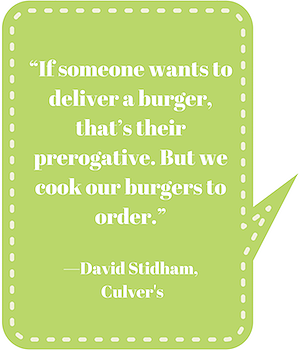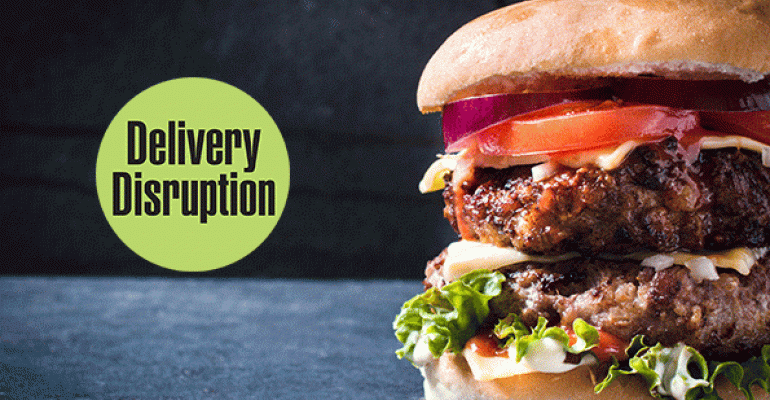Burgers are better fresh, which is why Culver’s doesn’t start cooking them until a customer orders one.
That quality diminishes over time. So the burger chain ultimately opted against approving any delivery service, believing the potential revenue gain wasn’t worth risking its trademark freshness.
“If someone wants to deliver a burger, that’s their prerogative,” said David Stidham, vice president of marketing for the Prairie du Sac, Wis.-based concept. “But we cook our burgers to order. We don’t put them under a heating lamp. We want them to enjoy the product off the grill. It’s just better.”
Delivery is a potential $70 billion business as consumers, increasingly short on time, seem more willing to pay higher fees to have someone bring food to them. The service is increasingly in demand, especially in busy urban areas, bringing a service once reserved for pizza or Chinese food or Jimmy John’s sandwiches to everything from sushi to chicken wings.
 But that service isn’t for everybody. A number of restaurant companies are deliberately skipping out on that trend — or are at least holding out — worried largely about the potential impact of the services on their brands’ reputations.
But that service isn’t for everybody. A number of restaurant companies are deliberately skipping out on that trend — or are at least holding out — worried largely about the potential impact of the services on their brands’ reputations.
Indeed, restaurants that employ delivery services run a risk of hurting their brand reputation if they don’t do it correctly, or if the service hurts their food quality.
“Not all revenue is good revenue,” said Kurt Schnaubelt, managing director with the consulting firm AlixPartners.
In March, for instance, the Boston-based seafood chain Legal Sea Foods sued the third-party delivery firm DoorDash over trademark infringement, claiming the service published the chain’s menus and trademarks without its permission. But the company’s main concern was the delivery itself.
In its complaint, Legal Sea Foods claimed that DoorDash “does not at all comport with the standards that consumers expect” from the chain’s food and service. In addition, the complaint says that the chain, “had no control over the time it takes” DoorDash to deliver the chain’s foods, the temperature at which the food is kept, or other food handling or sanitary procedures.
Similarly, the California-based burger chain In-N-Out Burger sued DoorDash for trademark infringement, saying that the quality of services provided by the delivery company “does not at all comport with the standards consumers expect” from In-N-Out.
Cost is another concern of some operators. Delivery companies typically make their money through a commission charged to restaurants and a fee to the customers, and not every restaurant finds the revenue growth worth it.
“Did you just trade a dine-in for a delivery visit that is potentially more expensive and with a lower average check?” Stidham asked. “The real issue is the incremental sale. The incremental sale is going to cover the cost most of the time, but it’s not a panacea.”
Another concern for some at this point is simply the Wild-West nature of the delivery industry. There are numerous players, with numerous strategies. It’s difficult at this point to sort it all out — or even keep pace with the burgeoning industry’s rapid changes.
Dallas-based fast casual pizza chain Pie Five Pizza predicts it will enable delivery from a third party company at some point, because customers are increasingly demanding the service.
But the chain is holding off endorsing delivery because there’s so much fluidity in the industry.
“We want to wait to find out who the leaders in the category are going to be,” said Christina Coy, vice president of marketing for the 90-unit chain. “There’s a lot out there. And there’s no guarantee anyone is going to be the best.”
Still, the biggest concern remains service and quality. At Culver’s, service is just as important as the temperature of the burgers, and the chain worries about the potential impact of a bad experience.
“We don’t like losing control,” Stidham said. “I don’t want to understate how important it is that our hospitality is involved. We have world-class team members. People love us. They come back because of the way they’re treated.”
Schnaubelt believes delivery represents a big potential business for some restaurant chains, but he said that not all foods travel well. Delivery might thus work for Asian and not so much for, say, burgers or steak or seafood.
“The first thing you have to ask yourself is whether you have the right kind of food,” Schnaubelt said. “You have to ask yourself how does the delivery experience create repeat business. If you’re serving a subpar product, you might want to rethink whether that visit or occasion is worth it.”
In general, if companies are going to do delivery whether in-house or through a third party, they need to do it well. Even if they use a third party, the food has to be prepared properly and packaged right so it arrives fresh and not leaking. Otherwise, “You hurt your brand as opposed to make it better,” Schnaubelt said.
PizzaRev, a 33-unit fast-casual pizza concept, has been gradually expanding delivery and it’s now available at 10 locations and with two services, Postmates and Grubhub. PizzaRev’s chief marketing officer Jeff Zuckerman said the company carefully vetted the services, to make sure that drivers use heat bags. He also said the chain limits the delivery radius so the food gets there quickly.
“It can hurt your brand,” Zuckerman said. “Especially with a brand like ours with an in-store experience. If your first experience is through delivery and you don’t like the pizza, you’re not coming back regardless of how many bells and whistles are in the store. But so far we feel good about how we’ve been able to navigate this.”
For Culver’s, however, the risks are simply too great. “If I’ve got somebody sitting in a hotel room and they decide to order our product the first time and it gets there 20 minutes late and is not a high quality, they’re not going to come to Culver’s again,” Stidham said. “I’d rather have them not experience and wonder versus having a bad experience.”
Contact Jonathan Maze at [email protected]
Follow him on Twitter: @jonathanmaze





